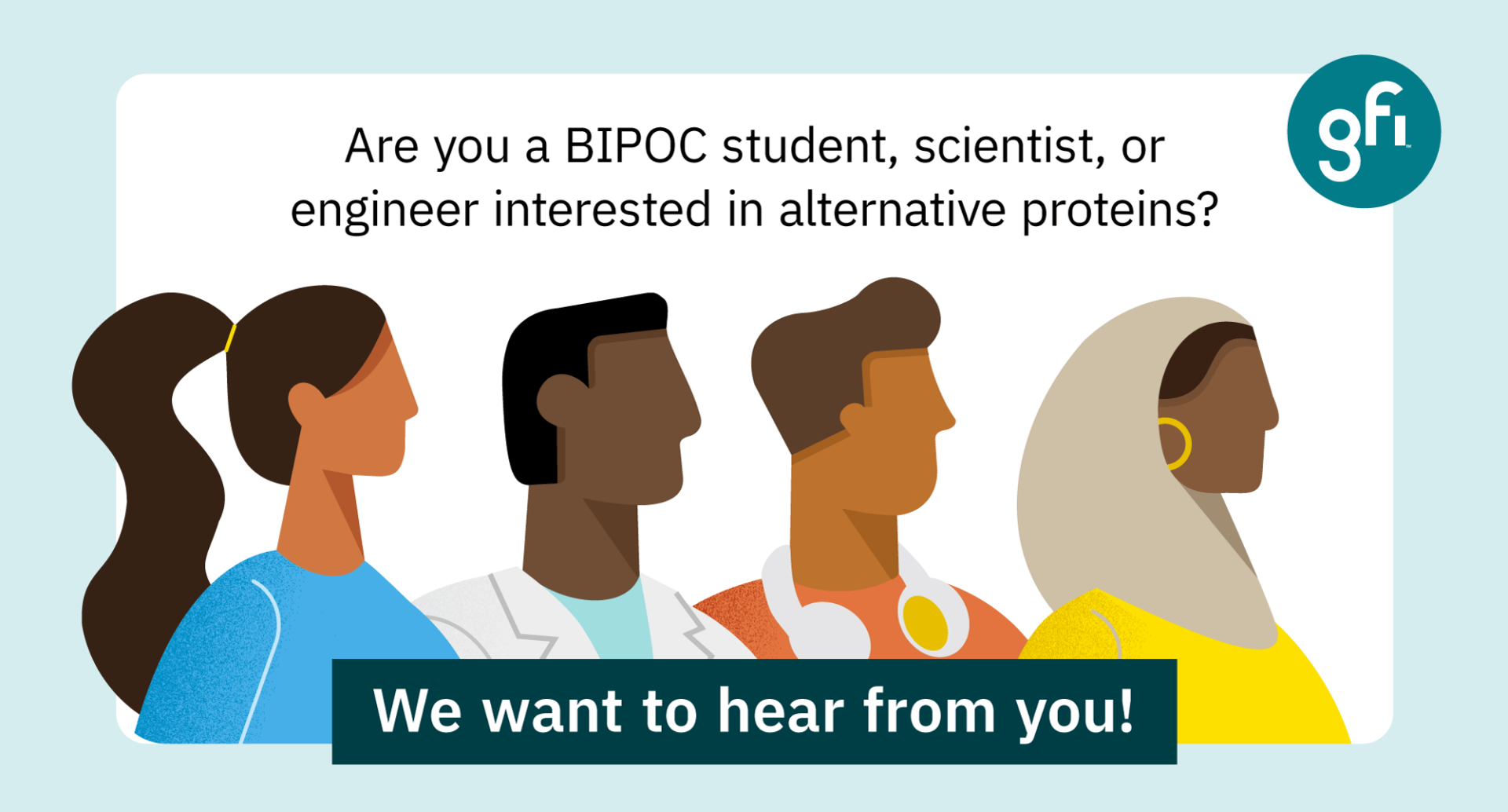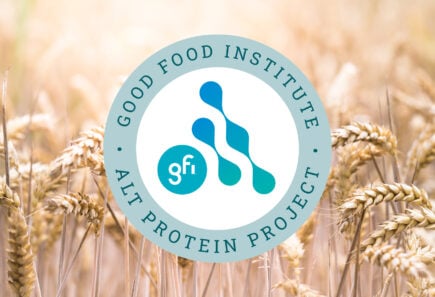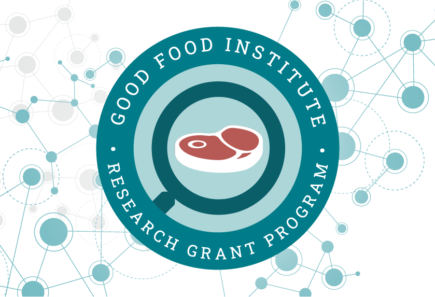
Needs assessment on building an inclusive alternative protein workforce
This report reviews the challenges faced by scholars from underrepresented and minoritized groups and describes opportunities for GFI and its partners to transform career development experiences for these individuals.
Eve Boyle, Ph.D., Christina Aguila, Amy Huang
Executive summary
We conducted a needs assessment that engaged scientists, engineers, and entrepreneurs who identify as Black, Indigenous, or persons of color (BIPOC). These listening sessions revealed several common experiences and resource needs that cut across disciplines and identities:

Mentorship and networking are essential for the career success of BIPOC scholars. Nearly all participants expressed a need for increased access to professional networks, mentors, and role models who reflect the diversity of the growing AP workforce.

Most participants have endured microaggressions, toxic work environments, and unequal access to knowledge and opportunities. These experiences have been particularly restrictive for students and scientists born outside of the United States.

Overall, the participants yearn for professional development resources that would make navigating AP career paths clearer, including resources to demystify the unwritten expectations and cultural norms of academia, STEM research programs, and startups.
We recommend several actions for GFI, universities, companies, professional associations, and federal government agencies to consider based on these listening sessions while taking into account best practices and current trends in STEM workforce development and feedback from GFI’s Science & Technology team.
These recommendations detail options to develop resources to navigate the “hidden curriculum,” resources to facilitate career planning and pivots, networking and mentorship opportunities, training and funding programs, and tools for research and funding transparency. We also describe opportunities for GFI to address resource and opportunity deficits due to an institution’s or individual’s location, such as ways to expand access to educational resources and suggestions for connecting colleges, universities, and AP companies.
We look forward to the prioritization and implementation of many of these recommendations. Future versions of this study should be globally focused and consider other populations within the STEM workforce.

Introduction
The alternative protein (AP) field needs to develop a diverse, inclusive workforce to power the future of food. GFI recognizes the value of diversity in providing different perspectives, experiences, and expertise. Given that alternative proteins are an emerging field, we believe this foundational stage of sector development presents a unique opportunity to build an inclusive culture. However, the marginalization of scholars who identify as Black, Indigenous, and people of color (BIPOC) has been persistent in the fields of science, technology, engineering, and math (STEM) and it’s unlikely that a truly inclusive AP field will unfold without deliberate efforts to ensure it does.
AP research and education ecosystems cannot thrive without diversity, equity, and inclusion (DEI). As we strive to transform our food system through AP, we cannot afford to undervalue the exceptional talent and perspectives that exist within historically marginalized groups, especially BIPOC scholars.
Scholars from over two dozen disciplines work in AP research. The diversity of pathways into the AP field offers a variety of opportunities for GFI, universities, companies, professional associations, and federal government agencies to support the development of equitable and accessible research, education, and training experiences.
Purpose of the needs assessment
This needs assessment informs GFI’s strategy for cultivating a diverse technical workforce for the AP field. It determines the highest priority needs for historically marginalized groups in the AP field by conducting need finding interviews.
We intend for the recommendations generated from this report to assist AP stakeholders with prioritizing actions that can facilitate the development of education, outreach, and training pathways for BIPOC communities to enter the AP workforce.
“The diversity of pathways into the alternative protein field offers a variety of opportunities for stakeholders to support the development of equitable and accessible experiences.”

Methodology
Interviewee interest form
We created an interest form via Google Forms to assess respondent interest in participating in a one-hour listening session to discuss their career paths. The interest form questions were designed using best practices for inclusive demographic data collection.
Recruiting strategy
A promotional graphic and link to the interest form were shared on GFI’s social media channels, including Twitter and LinkedIn. A recruitment email was sent to various GFI listservs including the Alt Protein Project, the Reimagining Protein newsletter, GFIdeas, the collaborative researcher directory, and the grantee list.
The recruitment email was also shared with contacts at relevant professional societies and organizations including:
- The National Organization for the Professional Advancement of Black Chemists and Chemical Engineers
- The National Society of Black Engineers
- The Society of Hispanic Professional Engineers
- The American Indian Science and Engineering Society
- Materials Research Society
- The American Chemical Society Committee on Minority Affairs
- Latinos in Science and Engineering
- National Action Council for Minorities in Engineering
- The Society for Advancement of Chicanos/Hispanics & Native Americans in Science
- Minorities in Agriculture, Natural Resources, and Related Sciences
- Black, Indigenous, and People of Color in the American Society of Agricultural & Biological Engineers

Participant selection
Fifty-four individuals filled out the interest form. We excluded 17 respondents who did not reside in the United States. We used professional details available on LinkedIn, company websites, and university web pages to screen the remaining eligible respondents for relevance to the project. Twenty-six respondents were invited to conduct listening sessions, and nineteen listening sessions were conducted. Additionally, we spoke with one consultant who has experience supporting research development at land-grant universities. All interviewees were provided gift card compensation for their participation, following common practices for research incentives.
Listening session design
The listening session questions were designed with an anti-deficit framework, and encouraged participants to share their thoughts on the following:
- Inspiration and motivations for pursuing a STEM career.
- Highlights and most rewarding parts of their career.
- People, resources, and opportunities that have facilitated their success.
- Difficulties and most challenging parts of their career.
- Experiences with discrimination, differential treatment, and unequal access to opportunities.
- The support they believe will help other scholars like them advance their careers.
- Ways GFI and other organizations can build more inclusive pathways into AP careers.
Listening session questions
- What inspired you to pursue a [degree/career] in [insert discipline here]?
- When did you first hear about alternative proteins as a new scientific field?
- Can you tell us about how you first got interested in this research area? What is your desired career path in this field?
- If they do not currently conduct research on alternative proteins or work in the field: Have you ever considered working in the alternative protein space? If you have, what has prevented you from pursuing educational or research opportunities in alternative proteins?
- What have been the most rewarding parts of pursuing [your degree/your career] so far?
- Who or what are some of the people, resources, experiences, and opportunities to which you attribute your academic and career achievements?
- Have you ever felt that you’ve received differential treatment or unequal access to opportunities because of your background and identity? If you have any examples from the alternative protein space, please share those.
- What do you think compels BIPOC students and individuals to persist in STEM fields, despite the historical underrepresentation of same-race peers and faculty?
- What are some resources you wish were available to help you navigate your research and education when you first began pursuing this [career/degree]?
- Which resources do you wish were available to you now at your current career stage?
- Do you have any thoughts on how universities, professional societies, and the Good Food Institute can better support you and your peers along your career journeys?
- Is there anything else you’d like to share with us that you think would help the Good Food Institute build more inclusive career pathways into the alternative protein field?

Participant demographics
Nineteen individuals participated in listening sessions between January 4 and February 27, 2023.
Career stage
We spoke to one undergraduate student (5.3%), six graduate students (31.6%), five early career individuals (26.3%), and seven individuals more senior in their careers (36.8%).

Institution type
Eight participants are currently enrolled in or employed at universities (42.1%) and one is employed at a high school (5.3%). Five participants are employed at startup companies (26.3%), three at mid-sized companies (15.8%), and one at a large company (5.3%). One participant is currently in between jobs (5.3%).

STEM discipline
Most participants either identify as bioengineers or biomedical engineers (26.3%) or as food scientists or food engineers (21.1%)

Production platform
Of the sixteen participants who previously worked, currently work, or hope to work in the AP field, nine are interested/experienced in cultivated meat (56.3%), three in plant-based meat (18.8%), one in fermentation (6.3%), and three work across multiple platforms (18.8%).

Geographical representation
Seven participants reside in California (36.8%). Colorado, Massachusetts, and New York are each home to two participants. The remaining participants reside in Alabama, the District of Columbia, Indiana, Pennsylvania, Texas, Vermont, and Wisconsin.

Gender
Twelve participants identify as female (60%) and seven as male (35%).

Race
Seven participants identify as Asian (36.8%), five as Black or African American (26.3%), three as two or more races (15.8%), two as American Indian or Alaska Native and at least one other race (10.5%), and one as Latino (5.3%). One participant chose not to disclose their race (5.3%).

Ethnicity
Eleven participants identify as not of Hispanic, Latino/a/x, or Spanish origin (57.9%), four as Mexican, Mexican American, or Chicano/a/x (21.1%), two as another Hispanic, Latino/a/x/ or Spanish origin (10.5%), and one as some other race, ethnicity, or origin (5.3%). One participant chose not to disclose their ethnicity (5.3%).

Other identities
One individual shared that they are a member of the LGBTQIA+ community (5.3%). Four individuals shared that they were first-generation college students (21.1%). Nine individuals shared that they are immigrants or international students (47.4%).

FINDINGS
Career inspirations & aspirations
The pursuit of STEM careers
Most participants became interested in STEM fields while in high school (63.2%), with their interest sparked through science and math classes. Three participants shared that they were also influenced by health and science issues in their hometowns (15.8%). Four were inspired by their parents’ careers (21.1%). One participant chose to study engineering due to a love for LEGO and robotics (5.3%).
Another common motivation to pursue STEM careers was the desire to produce work that was directly applicable to solving societal challenges and improving other people’s lives (21.1%). Three participants shared that they chose to pursue STEM careers due to the interdisciplinary and broadly applicable nature of their degrees (15.8%). Three others solidified their commitment to a STEM career after completing undergraduate research projects (15.8%).
Interest in the alternative protein space
Two participants (10.5%) have not considered working in AP, largely due to their limited knowledge of career paths in this industry. Two others (10.5%) have considered careers in this space, but are focusing on other career goals for now. One of these individuals shared that they would eventually like to support public health interventions that incorporate cultivated meat products. Eleven participants currently have positions that involve AP research, either at companies or universities (57.9%). Four other participants (21.1%) want to or have previously worked in the AP space, but have faced obstacles such as layoffs, company closures, or the inability to secure a research position, internship, or other entry-level position. These individuals indicated that a combination of toxic work environments and strained interpersonal relationships have adversely impacted their ability to build a successful AP career. Four participants were drawn to working in AP due to personal experiences with vegan or vegetarian diets (21.1%). Three participants became interested in AP through university or work research projects (15.8%). Three others were motivated to develop sustainable AP products that can reach consumers (15.8%), and two were inspired by Mark Post’s first public demonstration of a cultivated meat burger (10.5%).
Career goals
Sixteen participants previously worked, currently work or hope to work in the AP field. Most hope to work at an AP company either as a data-driven decision maker (6.3%), research scientist (18.8%), or in a people management or leadership role (31.3%). One participant is close to retirement but would consider a senior adviser role (6.3%). Three participants hope to conduct AP research in an academic position at a university (18.8%). The three remaining participants are unsure of their next steps (18.8%).

FINDINGS
Career highlights & facilitators of success
Most rewarding moments
Ten individuals (52.6%) shared that their participation in prestigious and competitive opportunities has been the most rewarding part of their careers. These include the New Harvest fellowship, academic scholarships, internships with federal agencies and startups, being featured as an expert on an industry-wide panel, and the opportunities to co-found and/or sell their own companies.
The other most common rewarding career moments include working as a practicing scientist (e.g., problem-solving, conducting research, writing scientific articles) and meeting diverse and talented people such as other students, laboratory scientists, and investors. These answers were each mentioned by seven participants (36.8%).
Four participants (21.1%) enjoyed seeing the tangible impacts of their work on the world, particularly through the development of AP food products. The opportunity to serve as a mentor to more junior scholars and the opportunity to receive good mentorship were each mentioned by three participants (15.8%).
Other participants valued the opportunity to travel for work, including professional conferences (10.5%), giving back to the community, such as by serving as a judge for scientific competitions or conducting outreach with youth (5.3%), and achieving the goals and career they’ve dreamed of since childhood (5.3%).
Keys to career success
Nearly all participants attributed their successes to supportive and dedicated mentors (84.2%). These mentors included high school teachers, undergraduate professors, graduate advisers, more advanced graduate students, and job managers. These mentors provided emotional support, facilitated research and training opportunities, and served as role models. One participant who went to an HBCU felt her professors fostered academic resilience and taught students how to be scholars:
“I had Black professors who all had PhDs in the sciences. Anytime you struggled it was never, ‘Oh this isn’t for you.’ It was, ‘Just go back and do it again.’”
The diversity of pathways into the alternative protein field offers a variety of opportunities for stakeholders to support the development of equitable and accessible experiences. Parental, partner, extended family, peer, and friend support was also critical to the success of eleven participants (57.9%).
Five participants partially attributed their career achievements to funded training and professional development opportunities including scholarships, internships, grants, and fellowships (26.3%). Two participants (10.5%) shared that public speaking opportunities were beneficial.
Two participants shared that their university’s training, mental health, and DEI resources enabled their success (10.5%), and two others credited career counselors and preparation resources (10.5%). Lastly, four participants shared that organizations such as IFT and MANRRS facilitated networking, professional development, and career achievements (21.1%).

FINDINGS
Career challenges & differential treatment
Three participants, all male, stated that they have not received unequal access to opportunities or differential treatment because of their background or identity (15.8%). Two others shared that they have received unequal treatment, but they haven’t felt or seen this inequity in the AP space (10.5%). Unfortunately, most of the scholars we spoke to did share that they experienced microaggressions, toxic work environments, unequal access to opportunities, and other differential treatment based on their background or identity, both in the AP space and more broadly.
Microaggressions
Eleven participants (57.9%) described experiencing gender- and race-based microaggressions during college, graduate school, or at work. These included assumptions made about their abilities based on racial or ethnic stereotypes and derogatory comments directed toward participants who identify as female. Two participants (10.5%) also described feeling tokenized at jobs that prioritized hiring BIPOC employees but did not do enough to ensure safe work environments. One participant shared:
“By now, I’m almost desensitized to the fact that if I walk into a room or on a manufacturing floor, there are hardly any women … It does have its challenges at times, but you just learn how to develop a thick skin and deal with it.”
Toxic work environments
Several participants experienced more forthright mistreatment (36.8%), including discriminatory comments from faculty members or managers, and other biased behaviors that contributed to toxic work environments. One scholar suppressed herself to survive for the first six years of her career:
“I had to be polished enough to be deemed nonthreatening, to be promoted and to be given opportunities. I slowly lost a piece of myself.”
Unequal access to opportunities
Three participants described a lack of access to training opportunities and resources due to where they went to school (15.8%), and two others experienced unequal access to knowledge and mentors in startup environments (10.5%). One participant was offered only 1% equity in the AP company he co-founded:
“I didn’t have the foundational knowledge to understand that it seemed wrong. I had no one to go to and ask if it was right or fair.”
Barriers for international scholars
Participants born outside of the United States have struggled with securing internships, jobs, and work visas (26.3%), with some experiencing discrimination during recruitment and hiring processes. A few participants explained that since companies typically hire from their pool of interns, they will often forgo selecting international applicants due to the financial burdens associated with sponsoring future work visas. One shared, “The opportunities look like they’re there. … For example, I got this internship, went through the entire interview process, and at the very end they told me, ‘We are not able to pay you because you’re on a visa … you can still intern with us, but we won’t be able to pay.’ I had to decline that internship.”

FINDINGS
Perseverance of BIPOC scholars
Support systems
Several factors contribute to the perseverance of BIPOC scholars in STEM fields, despite the historical underrepresentation of same-race peers and faculty. One of the most significant influences on the listening session participants was the camaraderie they shared with other BIPOC scholars. Seven participants (36.8%) expressed how important it is to have a peer community they can relate to. One participant confirmed:
“Meeting other people of color in my field has been very inspiring and a source of support.”
Two participants acknowledged the importance of persisting in STEM fields to serve as role models for the next generation of BIPOC scientists (10.5%). One other participant noted that financial and emotional support provided by family members is a privilege that some BIPOC scholars can rely on, too (5.3%).
Passion & work ethic
Three participants shared that a passion for science and the ability to make a difference in the world encourages BIPOC scientists and engineers during rough moments (15.8%). One participant elaborated, “Passion and love for science motivate people to stay in difficult positions … passion allows people to persist through adversity.”
Two participants noted that when this passion starts at a young age, through exposure to STEM career paths, it is especially ingrained as a motivating force (10.5%).
Another internal motivation is the strong work ethic possessed by BIPOC scholars. Three participants felt compelled to persist in STEM to demonstrate that they were capable and could be the first in their families to accomplish specific academic and professional milestones (15.8%).
Secure futures
Several participants acknowledged that the financial and professional security afforded by careers in STEM is a compelling force for many. One participant noted that BIPOC scholars persist in STEM since jobs in these fields command respect and are in high regard (5.3%). Four participants shared that many BIPOC students are drawn to
STEM fields because of the relatively high salaries (21.1%). These higher salaries yield an opportunity to improve outcomes for themselves, their families, and their communities.
Lastly, two participants mentioned that careers in STEM are relatively open and accessible to international students, and may offer a clear path to permanent residency or citizenship (10.5%). Therefore, international students and scientists in the United States are motivated to succeed because of the multitude of opportunities that emerge. According to one participant, “A career in STEM in the United States can be a path to the life you want.”

FINDINGS
Resource needs for BIPOC scientists
Guides to the hidden curriculum
The hidden curriculum—or the unspoken rules, hidden expectations, and cultural norms of academic spaces—has long been acknowledged as a barrier faced by immigrants, first-generation college students, and BIPOC scholars. Eight participants felt they would have benefitted from written guidance or informational events that explained the cultures of graduate school, research labs, and startup environments (42.1%).
Career planning resources
Similarly, twelve participants stated that they would like more degree and career planning resources (63.2%), especially for transitioning across sectors or production platforms. Examples include the expansion of accredited introductory courses, guides on how to build AP career paths, access to industry-specific career counselors and recruiters, and AP-focused career fairs and job boards.
Networking opportunities
Eleven participants acknowledged that networking is critical and that they would have liked better access to activities and resources that build camaraderie (57.9%), such as digital communities, networking events, research summits, peer support groups, and affinity groups. While virtual convenings were useful to connect with other scientists during the height of the Covid-19 pandemic, there is a desire for more in-person offerings, particularly outside of AP hubs (e.g., San Francisco Bay Area, Boston).
Mentorship
Seven participants are seeking stronger, more culturally competent mentorship (36.8%). Specifically, they shared a need for more BIPOC and female mentors across all career stages who can provide guidance on how to navigate pivotal career decisions. One participant said:
“I was lucky that my adviser was Indian and he could understand some cultural context of where I came from. But there are plenty of people who are not that lucky or their advisers are not as understanding. I think it would be really helpful if they could get some other support from BIPOC professionals.”
Training & funding opportunities
Gaining access to research and training opportunities requires access to funding, especially for individuals who are unable to fund their own education and training. Seven participants shared a need for improved access to internships, scholarships, grants, research assistantships, and venture capital (VC) funding (36.8%).
Research & funding transparency
Lastly, three participants are seeking accessible resources for companies to be transparent about fundraising successes, research progress, and any failures (15.8%). This would help build trust between a company’s employees and its executives.

Discussion
Understanding the present to change the future
Despite the historical underrepresentation of same-race and same-gender peers and faculty, the nineteen BIPOC scholars we spoke to have made incredible career achievements.
They’ve often been the only BIPOC individuals in their classrooms, laboratories, and places of work. They’ve conducted essential research, built bioreactors, and founded AP companies. They’ve risen through the ranks, and without many role models in this nascent industry, they’ve carved out their own fulfilling and inspiring career paths.
Understanding their stories, successes, and the barriers they’ve overcome can help GFI, universities, companies, professional associations, and federal government agencies transform how students and scientists build careers in AP.
Points to reflect on
As we work to build more inclusive pathways into AP careers, there are several key points to consider, such as:
- Scholars from over two dozen disciplines work in AP research. How can we develop accessible resources that transcend disciplines?
- Based on this study, it appears that a relatively high proportion of BIPOC scholars in the AP field identify as first-generation college students and immigrants. These populations are particularly vulnerable to attrition along STEM career pathways. How can we design AP career paths such that first-generation students and immigrant scientists can thrive?
- GFI cannot transform AP career pathways alone. How can AP stakeholders best develop and leverage partnerships to build better research, training, and professional development opportunities for BIPOC scholars?
“Understanding the stories and triumphs of BIPOC scholars can help AP stakeholders transform how students and scientists build careers in alternative proteins.”

Recommendations for alt protein stakeholders
These recommendations were developed based on suggestions from listening session participants, trends in DEI and workforce development interventions across STEM fields, and feedback from GFI’s Science & Technology team.
How to better support BIPOC scholars along AP career pathways

Increase awareness of AP careers
Over half of the session participants became interested in STEM careers during high school. GFI and other organizations can inspire STEM exploration and increase awareness of AP careers by facilitating outreach activities with high school students.
Organizations can develop a handful of lesson plans following the Next Generation Science Standards and make these resources accessible through GFI’s alternative protein teaching library. These high school lesson plans can be used for in-classroom or out-of-classroom instruction conducted by interested teachers across the country, or by undergraduates involved with the Alt Protein Project or other student groups.
Additionally, AP stakeholders could organize outreach events that coincide with in-person AP conferences or summits. AP scientists and entrepreneurs can visit high schools or youth empowerment organizations while in town for these convenings. AP scholars can also participate in virtual engagement options, such as “Skype a Scientist.”
Increasing awareness of AP careers is also important for college and university students. GFI can continue efforts to expand the Alt Protein Project, particularly at universities that are classified as minority-serving institutions (MSIs), public and land-grant universities, and emerging research institutions.
GFI, professional associations, and AP companies can deepen connections with universities by working closely with food-science clubs and student organizations focused on the empowerment of BIPOC individuals. GFI and AP companies can also table at college and university job fairs.
Professional development
Stakeholders in the AP ecosystem can support professional development at several stages across AP career pathways.
For college and university students, GFI and other organizations can develop degree maps and career planning guides that can help students choose which undergraduate courses, majors, minors, and extracurricular activities may be the most useful for a career in AP research. This may require edits, expansion, or companions to GFI’s Student Resource Guide. Additionally, an AP-specific document in the style of Richard Lawler’s “So You Want to Go to Grad School” would help explain the graduate school selection and application process for students who are not familiar. Knowledge-building workshops for resume preparation, securing research opportunities, and enhancing science communication skills would also support undergraduate students interested in AP careers.
For graduate students, professional development assistance could come in the form of webinars and career panels that expose students to the multitude of job options and career paths available across the AP ecosystem. Workshops that provide a forum to troubleshoot research problems or detail how to find and secure mentors who work in AP would also be beneficial for this group.
For early career scientists, a resume bank could enable easier transitions from academia into the industry workforce. Organizations could also develop resources for these scientists to enhance their nontechnical skills in areas that are essential for working at AP companies. Skills such as project management, business skills, translatable skills, and demystifying startup and corporate culture could be delivered through virtual or in-person workshops, or by expanding The Good Food Startup Manual.
For mid-career and senior career scientists, professional development related to leadership skills and people management is critical. Additionally, this demographic may be interested in guidance and resources to facilitate career pivots across the AP ecosystem, as their interests and professional goals may expand and change after working for several years in high-level positions.
Expand training & funding opportunities

Increasing the availability of, and access to, training opportunities and funding sources is essential for the success of BIPOC scholars across their careers.
For undergraduate and graduate students, GFI, AP companies, and professional associations can work together to expand opportunities for paid internships. To build the research experiences of graduate students, these entities could also co-sponsor fellowships, traineeships, and dissertation grants.
AP companies and GFI can also collaborate to sponsor student product development competitions. In addition to awarding cash prizes, these competitions would facilitate innovative and entrepreneurial thinking and encourage students to make links between contemporary issues, academic research, classroom lessons, and industrial production.
Early career researchers would also benefit from financial support for research and training, such as grant awards, postdoctoral positions, or research fellowships. Additionally, GFI could facilitate connections between early career scientists and entrepreneurs, VC funding, and angel investors.
Mid-career and senior career scholars would also benefit from research and seed funding. Even further, professional associations, universities, and GFI could co-sponsor faculty or scientist development grants that would allow these scholars to pursue exploratory projects, community engagement, seminar or course development, and other scholarly activities.
Organizations can also sponsor a policy fellowship, which may be of interest to mid-career and senior-career AP scholars looking to advance their careers outside of academia or industry. A potential mechanism for this fellowship could be via a partner society agreement with the AAAS Science and Technology Fellowship program.
For international scholars who are out of school, finding companies to support work visas is a huge barrier to securing employment. AP trade associations can work to become more involved in nationwide calls to reform employment-based immigration and work visa programs.
Mentorship & networking
Most listening session participants expressed a need for more accessible and effective networking and mentorship opportunities. To connect AP scholars across their career paths, GFI could develop a tiered mentorship program. This program would create mentorship chains that would foster connections between graduate students, postdoctoral fellows, early-career scientists, mid-career scholars, and senior researchers. The individuals in the middle of these chains would serve as both mentees and mentors, and all individuals would expand their professional relationships. Such a program could build off of existing networks and infrastructure established by GFI’s 1:1 mentor program.
Networking can be supported through research symposia that highlight the work of graduate students, or other in-person professional summits. The creation of BIPOC- and women-focused affinity groups would create safe spaces for these individuals to build stronger communities within the AP ecosystem. To coordinate these offerings, GFI could leverage the networks currently established through GFIdeas seminars, roundtables, workshops, and networking sessions.
Amplify voices

Lastly, AP stakeholders could expand the ways they amplify the voices and stories of senior scientists. Many listening session participants shared a desire for more visible, accessible, and diverse role models.
Career profile seminars, interview series, or other events that highlight the accomplishments of senior scholars would both celebrate these scholars and motivate the next generations of AP researchers.
How to address resource & opportunity deficits due to location
Expand educational resource access
To reach BIPOC students and scientists who are fluent in languages other than English, GFI, and its partners can work to ensure that AP learning materials, technical reports, and introductory courses are provided in multiple languages. Some of the listening session participants described their struggles finding undergraduate and graduate courses to take that would fulfill degree requirements. GFI and other organizations can collaborate with university consortia to ensure that AP courses are offered across institutions within a region. Alternatively, GFI can expand the development and promotion of accredited massive open online courses, such as The Protein Transition, to allow students to get course credits from classes they can take virtually.
Facilitate connections across institutions
To reach researchers and institutions from often neglected regions, in-person conferences, and networking events should be held in cities outside of AP hubs. GFI can also develop tools and activities to assist AP companies with recruiting and hiring BIPOC students from rural, minority-serving, and emerging research institutions, such as AP-specific resume banks, job boards, and recruiting events. This would require adapting and expanding GFI’s career portal and talent database. Additionally, GFI and federal agencies can better facilitate partnerships among land-grant institutions, MSIs, research universities, and startup companies. These partnerships could be forged through a collaboration clearinghouse or capability statement bank, where an institution could advertise their facilities’ capabilities and research expertise, similar to NASA’s MSI Exchange.
Where to begin?
Where do GFI and other AP stakeholders fit in?
The Good Food Institute is not the only organization with the ability to transform AP career pathways for BIPOC students and scientists. Several of the above recommendations may be best implemented by other entities, particularly those that are not specific to the deficits and opportunities across the AP field.
For example, universities would be well-suited to design knowledge-building workshops on topics such as resume preparation or securing on-campus and summer research opportunities. The government relations offices of universities are essential for advocating for federal policies to improve support and career outcomes for international students, including immigration policies and work visa programs. Some recommendations could be facilitated through the career development, student engagement, and/or corporate partnership divisions of professional societies across relevant STEM disciplines. Federal agencies and AP companies are instrumental in building interventions requiring strong partnerships.
GFI is a builder of community, a trusted liaison across sectors, and a leader in distributing technical reports and other guidance to AP scientists. GFI is therefore uniquely positioned to implement programs that build on existing infrastructure for strengthening professional networks, leveraging partnerships, and disseminating resources.
Transforming and building new partnerships
So where to begin? We suggest that GFI and its partners first focus on transforming and building new relationships with individuals, universities, professional societies, and startup companies who will be instrumental in designing long-term interventions to support the career success of BIPOC scholars. Organizations to prioritize include the scholarly organizations and institutions of higher education that serve and empower BIPOC students and scientists.
Ample time should be allocated to building and maintaining strong relationships before implementing any event, program, or initiative. In particular, care should be taken to ensure that partnerships with MSIs and professional associations serving BIPOC scholars are genuine, mutually beneficial, and truly cooperative. To achieve this, organizations must foster trust early with new partners and take action to maintain this trust. Team members should forge new relationships intentionally, communicate through shared values, and ensure that all interactions are infused with patience, respect, and cultural competence. Furthermore, in the spirit of “Nothing About Us Without Us,” all partners should have as much of a voice as possible in the design, oversight, and implementation of any collaborative initiative.
Building new resources and initiatives to address unmet needs
Stakeholders in the AP ecosystem should then prioritize the design of any new resources and initiatives to address the unmet needs of BIPOC students and scientists interested in AP careers. For example, for GFI this could include:
- Multimedia content (e.g., blog series, podcast, webinar series) that will spotlight the career stories of women and BIPOC scientists and innovators.
- Additions to the AP career portal, including creating a career advice guide that helps individuals understand various career decisions (e.g., choosing a job in industry vs. academia, how to navigate graduate school).
- A tiered mentorship program to connect BIPOC scientists across career stages.
- A funded research fellowship, apprenticeship, or training program to support early career scholars in their transition after graduate school.
Weaving DEI programming into existing resources and programs

While building the longer-term interventions, team members could simultaneously weave new DEI-focused programming into existing resources and programs. For example, for GFI these include:
- Expanding the training, professional development, and outreach capacity of the Alt Protein Project (APP). The student members of APP serve as ambassadors and community builders in over thirty cities around the world. GFI can train these student groups to develop activities to 1) strengthen these students’ career trajectories and 2) increase the inclusivity of the STEM workforce in their local communities by working with high schools, extension programs, and local chapters of national professional associations. Such training may include informational sessions on how to navigate graduate school, or workshops on how to improve science communication and community engagement skills. It may also be beneficial to provide small grants (e.g., $3,000) for APP chapters to organize and host in-person AP networking events and conferences for the cities they represent. Furthermore, it is important to be mindful of the resource deficiencies faced by student groups at emerging research institutions. GFI should ensure that APP chapters at MSIs and emerging research universities are well-equipped to pursue scholarly and collaborative activities, despite limited financial, administrative, and human resources on their campuses.
- Additions to the GFI alternative protein teaching library will enhance the understanding of the science behind APs among high school students, undergraduates, and adult learners.
- A proliferation of hybrid and in-person events and conferences, such as networking events, affinity groups, career panels, and professional development workshops.
- Spotlighting BIPOC voices in existing seminar series.
Future directions of DEI-focused assessments
In this study, we focus on the scientists and researchers living in the United States who were educated at four-year universities, many of whom pursued or will pursue a master’s or doctoral degree. Future iterations of this analysis should be focused on the global AP workforce, and include assessments of career trajectories along the AP value chain, including positions beyond research & development roles.
References
American Association for the Advancement of Science. “Partner societies.” Accessed May 3, 2023. https://www.aaas.org/programs/science-technology-policy-fellowships/partner-societies-st-policy-fellowships
Boston University. “Teaching the Hidden Curriculum: Inclusive Teaching Guides & Tips.” Teaching Writing. 2021. https://www.bu.edu/teaching-writing/resources/teaching-the-hidden-curriculum/
Fountain, Henry. “Building a $325,000 Burger.” New York Times, May 12, 2013. https://www.nytimes.com/2013/05/14/science/engineering-the-325000-in-vitro-burger.html
The Good Food Institute. “Add yourself to GFI’s talent database.” Accessed May 4, 2023. https://gfi.org/resource/adding-yourself-to-gfis-talent-database/
The Good Food Institute. “Alternative protein career portal.” Accessed May 4, 2023. https://gfi.org/vocation/
The Good Food Institute. “GFIdeas community.” Accessed May 4, 2023. https://gfi.org/community/
The Good Food Institute. 2023. “GFI Mentor Program.” https://gfi.org/resource/mentor-program/
The Good Food Institute. “Online course: The science behind alternative proteins.” Accessed May 4, 2023. https://gfi.org/resource/plant-based-and-cultivated-meat-online-course/
The Good Food Institute. 2019. “Pioneers of the future of food” https://gfi.org/resource/pioneers-of-the-future-of-food/
The Good Food Institute. “Student Resource Guide.” Accessed May 4, 2023. https://gfi.org/resource/student-resource-guide/
The Good Food Institute. “The Alt Protein Project.” Accessed May 4, 2023. https://gfi.org/the-alt-protein-project/
The Good Food Institute. “The Good Food Startup Manual.” Accessed May 4, 2023. https://gfi.org/resource/startup-manual/
Harper, Shaun R. 2010. “An anti-deficit achievement framework for research on students of color in STEM.” New Directions for Institutional Research, 148: 63-74.
Harvard University Office of Regulatory Affairs and Research Compliance. “ORARC Tip Sheet: Inclusive Demographic Data Collection.” 2020. https://cdn1.sph.harvard.edu/wp-content/uploads/sites/2102/2020/04/ORARC-Tip-Sheet-Inclusive- Demographic-Data-Collection.pdf
The Huffington Post. “‘Nothing About Us Without Us’ — Mantra for a Movement.” The Huffington Post, September 6, 2017. https://www.huffpost.com/entry/nothing-about-us-without-us-mantra-for-a-movement_b_59aea450e4b0c50640cd61cf
Lawler, Richard R. “So You Want to Go to Grad School.” Accessed May 4, 2023. http://www.propithecus-verreauxi.com/Grad_school.pdf
Marketing Partners. “Why Values-Based Communication?” Marketing Partners, October 10, 2019. https://www.marketing-partners.com/conversations2/why-values-based-communication
National Aeronautics and Space Administration. “Minority Serving Institutions Exchange.” Last modified May 4, 2023. https://msiexchange.nasa.gov/
Next Generation Science Standards.Accessed May 4, 2023. https://www.nextgenscience.org.
Skype a Scientist. Accessed May 4, 2023. https://www.skypeascientist.com
User Interviews. “The Ultimate Guide to User Research Incentives.” 2022. https://www.userinterviews.com/blog/the-ultimate-guide-to-user-research-incentives








